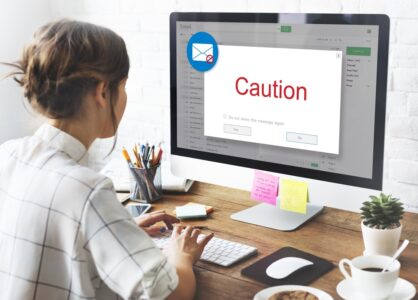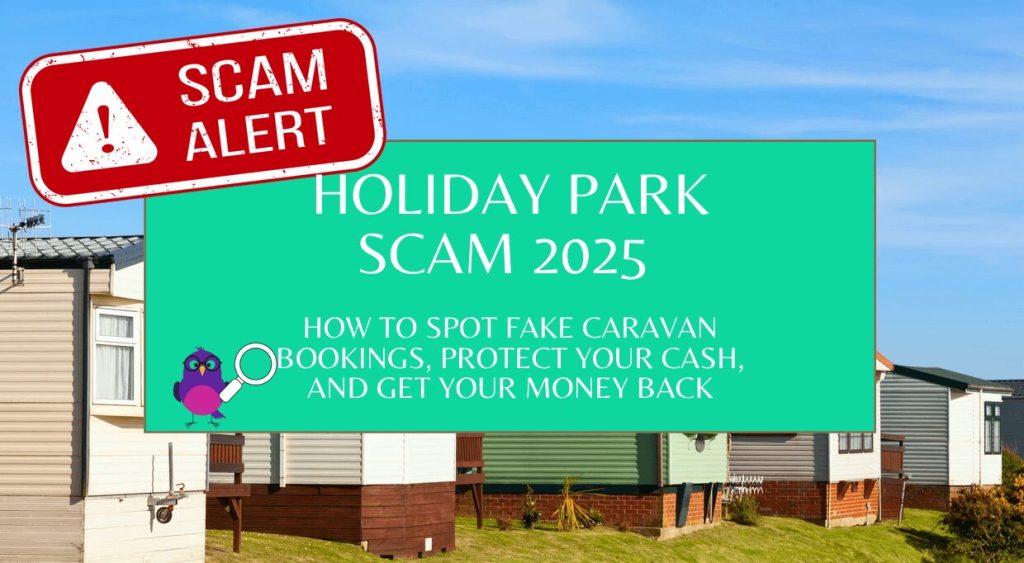![]()
![]()
Vicky Parry
4th Jul 2025
Reading Time: 4 minutes
Holiday Park Scams 2025: How to Spot Fake Caravan Bookings, Protect Your Cash, and Get Your Money Back
- ✅ How to spot a fake holiday park listing
- ✅ How to pay safely to protect your money
- ✅ Real stories from victims
- ✅ Verified legal advice on getting your money back
- ✅ Support networks if you’ve been scammed
What is a holiday park scam in 2025?


Fake holiday park scams involve criminals listing caravans or lodges for rent on Facebook Marketplace, local groups, or even cloned websites. They use attractive photos and bargain prices to lure you in, then ask you to pay by bank transfer or PayPal “friends and family,” which offers no protection.
When you arrive, there is no booking — or the caravan is already legitimately rented to someone else. The scammer disappears, leaving you stranded and out of pocket.
According to Which?, holiday fraud cost British holidaymakers over £12 million in 2023 alone, with caravan bookings remaining one of the fastest-growing targets.
How big is the problem in 2025?


The scale of the issue is alarming:
- In 2024, victims lost a combined total of £11,183,957 to holiday fraud, with 6,066 reports made to Action Fraud (Action Fraud alert)
- The average loss per victim was approximately £1,844 in 2024 (Watch Your Pocket)
- July 2024 recorded the highest number of reports, with 647 cases
- In the West Midlands alone, there were 312 reports of holiday fraud, with losses exceeding £546,000 (West Midlands Police)
Holiday booking scams remain one of the most common types of fraud reported to UK authorities, particularly during school holidays and summer months.
Real-life victims
This isn’t just statistics — real people are devastated:
- Nicola Smith, a mum of four, paid £500 for a caravan in Rhyl through Facebook. When she arrived, another family was already inside. She ended up sleeping in her car with her children.
- Dave and Kathy Pengelly lost £325 on a lodge at Looe Bay in Cornwall, when the seller vanished after payment. The holiday park confirmed at least five other families were scammed by the same person.
- Victims of a known Facebook scammer using the name “Lisa McGuire” have set up a group called Scammed by Lisa McGuire – Craig Tara with over 1,000 members sharing experiences and advice.
How to spot a fake holiday park listing
Before you pay, watch out for these red flags:
- ✅ Unbelievably cheap prices compared to the official site
- ✅ Requests for payment by bank transfer or PayPal “friends and family”
- ✅ High-pressure tactics to pay quickly
- ✅ No official paperwork or booking reference
- ✅ Refusal to take credit card payments
- ✅ Ads only on social media with brand-new profiles
- ✅ Bad spelling or grammar in listings
- ✅ No reviews or traceable previous bookings
Pro tip: Always call the holiday park directly to confirm your booking exists before paying.
How to protect your money
- ✅ Book through the official holiday park website or an ABTA/ATOL-registered agent
- ✅ Pay by credit card for Section 75 protection
- ✅ If you use a debit card, confirm you can do a chargeback if things go wrong
- ✅ Never pay by bank transfer or PayPal “friends and family”
- ✅ Keep all communications on the booking platform, not private chat apps
What to do if you’ve been scammed
- Contact your bank immediately:
- Credit card? Claim under Section 75
- Debit card? Ask for a chargeback
- Report to Action Fraud
- Report the fake profile or advert to Facebook
- Inform your local Trading Standards office
- Connect with other victims via Facebook groups or support forums
- Beware of “money recovery” scammers charging upfront fees
Legal advice and your rights (real sources)
- Which? Travel Expert:
“Holiday fraudsters are ruthless and will not hesitate to exploit people looking for a bargain break. People should be extremely wary of any deal that looks too good to be true and do their own research before booking. Paying by credit card gives you stronger protection if something goes wrong.” - Action Fraud:
“Where possible, pay by credit card. This offers the greatest protection. If you pay by bank transfer and it’s a scam, it’s very difficult to get your money back.” - Citizens Advice:
“If you paid for something costing more than £100 with a credit card and there’s a problem with it, you might be able to use Section 75 to claim your money back from the credit card provider.” - Financial Conduct Authority (FCA):
“Scammers may ask you to pay by bank transfer. This is the same as handing over cash – you may not get your money back if it goes wrong.”
Quick checklist before booking
| ✅ | Pre-booking check |
|---|---|
| ✔️ | Book via official park or trusted agent |
| ✔️ | Check reviews on independent websites |
| ✔️ | Pay by credit card for protection |
| ✔️ | Confirm your booking with the holiday park |
| ✔️ | Never pay by bank transfer |
| ✔️ | Keep all receipts and communications |
| ✔️ | Research the advertiser’s profile |
Where to get real support
Final word
Fake holiday park scams are on the rise in 2025, but with these tips, you can avoid being ripped off. Always book through official channels, pay by credit card, and confirm your booking directly with the park. If you get caught out, report it immediately and seek support.
Have you been targeted by a fake holiday park scam? Share your story below and sign up for our free MoneyMagpie newsletter for the latest fraud alerts.
Further Reading – Top 12 Holiday Scams and rip-offs

